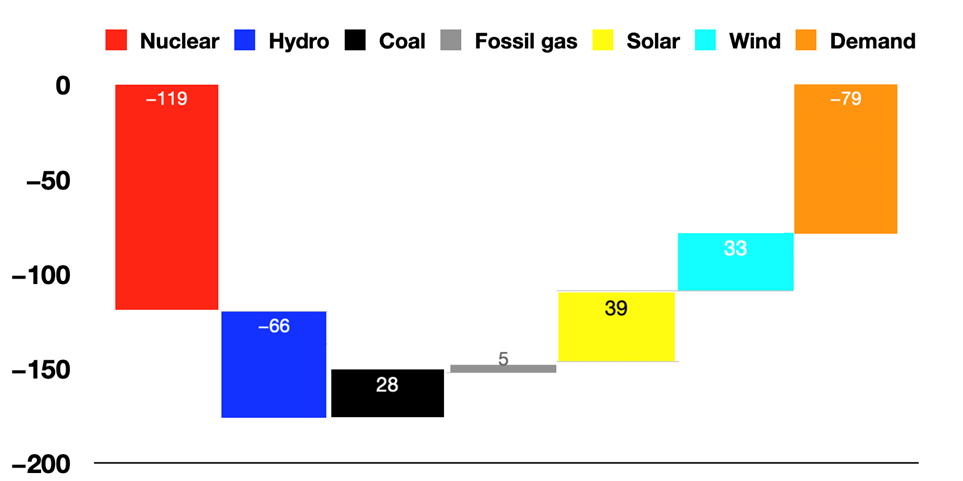The electricity prices in Europe have been high during 2022. Putin has claimed it is because of green policies. He said German nuclear phase-out does not make sense and claimed that without fossil fuels we have to "go back to the caves". Recently he has also claimed the European Union (EU) suffers more than Russia from the sanctions and decreased EU imports of Russian nuclear and fossil fuels. These arguments have been reiterated by some politicians and industries in the EU also supporting Putin’s image that the EU is decadent, ruled by irrational elites and on the way to chaos.
But the real numbers show something different. The main reasons are the unplanned and dramatic decrease in nuclear and hydro power generation. New renewable capacity has contributed low marginal cost supply, and reduced the price of electricity.
This is easily seen if one looks at how electricity production changed in the EU from 2021 to 2022.
If the cause of the cost increase had been increased fossil fuel prices, then fossil fuel use would have decreased. Other generators would have had to increase production instead, at higher costs, until a new equilibrium with less fossil fuels and more of other sources and reduced consumption at the higher price.
In the real world this was not what happened. It was the unintended drop in nuclear generation and hydropower that forced increased use of fossil fuels which contributed to an increased marginal cost of fossil fuels.
The change in EU electricity generation 2022-2021

Unintended is an intended choice of word for the part of the reduction of nuclear generation that caused the higher price. The intended decrease of nuclear did not have that effect on EU prices. Germany, as planned, closed three reactors at the end of 2021. Still, they increased their net exports of electricity more than they increased the electricity production with fossil fuels. Britain, though not part of the EU, officially closed three reactors during 2022. They managed to turn from being a net importer of electricity to becoming a net exporter. Sweden that has closed four reactors in the last decade for economic reasons was Europe’s largest net exporter of electricity – despite the fact that for some hours in December when 2 reactors where out of operation together with one generator on a third reactor, even Sweden actually imported a significant amount of power.
So, the idea that it is sanctions, green policies, nuclear decommissioning or the market economy of the EU that caused the high prices of electricity is not easily justified. Why has it been preached so strongly in European media?
The story fits to important interests: The Putin inspired organisations will defend the interests of Rosatom and Gazprom, and avoid the role of nuclear failures and the possible role of global warming causing the hydro power problems in southern Europe.
It fits well with the interests of the incumbent energy industry in Europe to defend the value of nuclear and fossil plants on their balance sheets. For the pro-nuclear actors it is difficult for admit that the cause is the failure of this technology in France.
We should not trust stories we are told, but look at the real world data.






